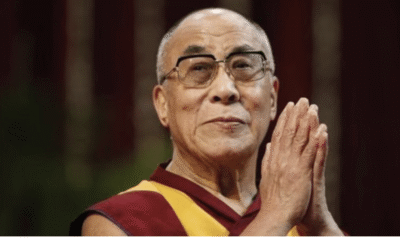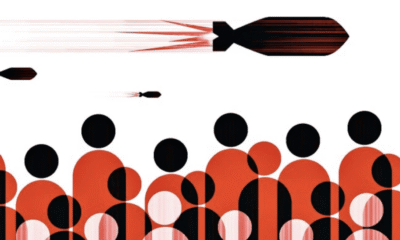
|
Getting your Trinity Audio player ready...
|
“All ideologies are idiotic, whether religious or political, for, it is conceptual thinking, the conceptual world, which has so unfortunately divided man”, renowned philosopher Master Jiddu Krishnamurti once lamented.
Europe was the mother of ideologies – from the capitalism of Adam Smith to the social conservatism of Thomas Hobbes and John Locke to the liberalism of John Stuart Mill to the communism of Karl Marx. All these ideologies have created schisms and confusion across the world, forcing American historian and social thinker Morris Berman to warn, “An idea is something you have. An ideology is something that has you.”
India has historically been the land of ideas. From the Vedic rishis through Mahavira, Buddha, Shankara, Aurobindo, and Vivekananda, the great men of India have generally been philosophers, articulating profound ideas for human welfare. India has not produced any ideologues such as Marx or Mill. Yet, the deeply philosophical ideas of its sages and savants have continuously inspired and influenced mankind across history and geography.
In the realm of socio-political ideas, there was only one original contribution made by India in the last century. That was Mahatma Gandhi’s non-violence and truthful resistance – famously known as ahimsa and satyagraha. Gandhi’s ideals inspired freedom-seeking peoples all over the world. Ahimsa entered the socio-political lexicon of the world for good.
But there was another originally Indian idea propounded in the middle of the last century, which was Deen Dayal Upadhyay’s integral humanist philosophy.
Philosophical doctrines are not easy to comprehend. Karl Marx and Frederic Engels propounded their communist ideology through Das Kapital in 1867. Marx continued his efforts at elaborating on it for more than a decade-and-a-half until his death in 1883. Yet, it took five decades for communism to find political expression in 1917 in Russia.
In the case of integral humanist philosophy of Deen Dayal Upadhyay, the effort needed to take forward the precis and develop it into a complete political philosophy was not made by his followers after his untimely passing in 1968. It looked complicated, and hence vague and fanciful theories such as Gandhian socialism preoccupied them for some years before they finally settled on a relatively easier formulation of cultural nationalism.
The world passes through various phases of transition from time to time. Nations get an opportunity to play a role in that transition. One such opportunity came after World War II in the last century when a new world order began to take shape. It was shaped largely by European and Western thought, although Gandhi too made a significant contribution. That world order has served mankind for over seven decades. But a new world order is taking shape today, in the aftermath of the Covid pandemic.
In that post-Covid world order, India has an opportunity to play a bigger role in the domain of ideas. Deen Dayal Upadhyay’s integral humanist philosophy can act as the sheet anchor for that. But the problem is two-fold.
One, wider Indian scholarship since Independence has been so deeply influenced by the Western paradigm that many cannot even think that India can offer an alternative worldview at this transitional juncture.
Two, in the liberal view, Deen Dayal Upadhyay represented India’s Right, conservative Hindutva movement. Globally a dominant force in the intellectual world, liberals abhor conservatism. They branded Hindutva as retrograde and unintellectual hocus-pocus and even attempted “dismantling” it recently.
Deen Dayal Upadhyay, thus, needs to be rescued from apathy on one side and antipathy on the other. His views regarding nation-building, national identity, social institutions such as caste and political institutions such as democracy remain as relevant today as they were six decades ago. They should be revisited from the prism of the contemporary Euro-centric ideas. Such an effort should not end up as Euro-scepticism but help throw light on the contemporary relevance of ideas that are rooted in Indian wisdom and milieu.
For example, contrary to the propaganda about Hindutva’s fascist credentials, Deen Dayal Upadhyay had zealously upheld democracy as the best available form of governance. But he added an Indian dimension to it by saying, “A democratic government, ‘Jana Rajya’, must also be rooted in Dharma, i.e., a ‘Dharma Rajya’. In the definition of democracy – of the people, by the people and for the people – ‘of’ stands for independence, ‘by’ stands for democracy and ‘for’ indicates Dharma. The true democracy is one where there is freedom as well as Dharma.”
“The philosophers have only interpreted the world in various ways. The point, however, is to change it”. These words were inscribed on Karl Marx’s tombstone. All interpretations of philosophers from the time of Plato were about making a “new man” — a “moral man”. Speaking at the United Nations General Assembly in 1950, United States President Harry Truman had said: “The United Nations represents the idea of a universal morality, superior to the interests of individual nations. Its foundation does not rest upon power or privilege; it rests upon faith. They rest upon the faith of men in human values — upon the belief that men in every land hold the same high ideals and strive toward the same goals for peace and justice”.
Those words sound hollow and hubristic today. But Deen Dayal Upadhyay’s integral humanist vision offers some hope.
(The article was originally published by Hindustan Times on October 22, 2021. Views expressed are personal.)



